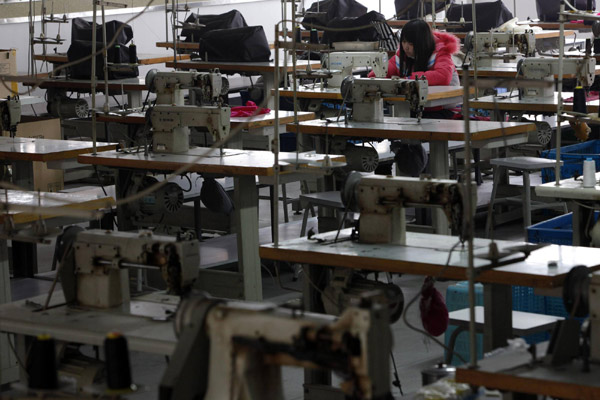Society
Left-behind kids keep migrant workers in hometown
By Song Wei (chinadaily.com.cn)
Updated: 2011-02-16 16:38
 |
Large Medium Small |
As a labor shortage sweeps across China's coastal cities after the Lunar New Year holiday, many migrant workers say their children, who were left behind in their hometowns, is the major reason they decided not to go back to the cities, Guangzhou Daily reported on Tuesday.
 A worker works while surrounded by unmanned sewing machines at the production line of a bag factory in Yiwu, Zhejiang province, Feb 15, 2011. China's booming coastal provinces are facing a labour shortage after the Lunar New Year holidays as the seemingly endless flow of migrant workers dries up. [Photo/Agencies]? |
| ||||
The main force of migrant workers – the post-80s generation (born after 1980) – has now become parents. More and more of them are realizing the importance of educating their own children.
"I may not be able to make big changes to my life, and I don't want my kid to follow in my footsteps,”"said Wei Dongwei, a 26-year-old migrant worker from Central China's Henan province who has been working in Yiwu, East China’s Zhejiang province for six years.
Wei quit his job in Yiwu, even though the factory promised him a salary raise to 2,600 yuan ($395) per month. Instead, he took a 2,300-yuan job five kilometers from home. "I'd rather earn less and stay with my 4-year-old son to help him achieve more," Wei said.
Wei said he found his son had developed a bad temper when he came back home this Spring Festival. "It seems there was a lot of grudge in his heart. My parents later told me the kids at his kindergarten often mock my son by saying his dad didn't want him anymore. If I could not be a responsible dad, my son would not amount to much," Wei said.
Other than left-behind children, factors such as rapid urbanization and economic development in China's interior have led to the labor shortage in coastal cities.
| 分享按鈕 |



